|
|
|
Sort Order |
|
|
|
Items / Page
|
|
|
|
|
|
|
| Srl | Item |
| 1 |
ID:
039976
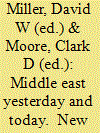

|
|
|
|
|
| Publication |
New York, Praeger Publishers, 1970.
|
| Description |
xx, 364p.Hbk
|
| Series |
George School Readings on Developing Lands
|
|
|
|
|
|
|
|
|
|
|
|
Copies: C:1/I:0,R:0,Q:0
Circulation
| Accession# | Call# | Current Location | Status | Policy | Location |
| 008073 | 939.4/MIL 008073 | Main | On Shelf | General | |
|
|
|
|
| 2 |
ID:
177204
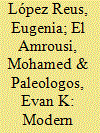

|
|
|
|
|
| Summary/Abstract |
Our work analyzes some key public, late modernist and contemporary buildings in Abu Dhabi in order to examine how the capital of this Arab country has dealt with issues of local tradition versus modernization, at a time of rapid economic and social change. Modernist and contemporary interpretations of Arab architectural tradition are deliberated as well as, design strategies to create spaces of social inclusion and provide sustainable solutions appropriate for the harsh regional climatic conditions. Our article also argues that recognition and integration of buildings from the late modernist era, such as the Abu Dhabi Cultural Foundation, are essential elements for a city of sparse historical references, playing the role of “modern heritage”. Preservation of such buildings and resilient architecture can guide contemporary architectural discourse and reconcile local tradition and modern design strategies, thus counteracting uncritical importation of iconic projects in the modern Gulf cities.
|
|
|
|
|
|
|
|
|
|
|
|
|
|
|
|
| 3 |
ID:
167547


|
|
|
|
|
| Summary/Abstract |
Philip K. Hitti was the first scholar to study Arab-American immigration to the United States. Highly influential during the twentieth century, his ideas have lost much of their appeal to current interpreters of the early diaspora of Arab-Americans called Syrians at the time. This article revisits Hitti's thought, focusing on the issues of Palestine and Arab identity. Using primary source material from Hitti's archived papers, plus multiple secondary sources, I argue that Hitti maintained consistency, both in his advocacy of the general Arab stance opposing a Jewish homeland in Palestine, and in his construction of Arab identity as different from Syrian identity. On Palestine, Hitti clashed with Albert Einstein, in public discourse and in an acerbic private exchange of correspondence. On Arab identity, Hitti held firm to a strict interpretation, distinguishing Syrians, conceptualized as Christian, from Arabs, conceptualized as Islamic.
|
|
|
|
|
|
|
|
|
|
|
|
|
|
|
|
| 4 |
ID:
147389
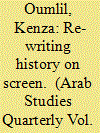

|
|
|
|
|
| Summary/Abstract |
This article examines how the award winning film Salt of This Sea (2008) responds to dominant gendered representations of Arab and Palestinian identity. The choice of this film is based on its significance as a contemporary cinematic text that aims to present alternative portrayals to those prevalent in the media. Furthermore, Annemarie Jacir is the first Palestinian female filmmaker to make a full-length feature film. The film puts a courageous female character (Soraya—played by Suheir Hammad) at the center of its narrative. It refreshingly departs from inflicting a male gaze on the lead female actor. Salt of This Sea responds to the dominant construction of Arab and Muslim women as passive with the portrayal of a determined heroine. In regard to portrayals of masculinity, the film attempts to challenge the core stereotype of Palestinian men as violent. Overall, the film is part of a movement to re-write a collective history, but it depicts dimensions of Palestinian history that are seldom shown in the mainstream media.
|
|
|
|
|
|
|
|
|
|
|
|
|
|
|
|
| 5 |
ID:
114098
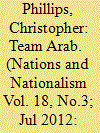

|
|
|
|
|
| Publication |
2012.
|
| Summary/Abstract |
The linking of living rooms across state borders by al-Jazeera and other pan-Arab satellite television channels has prompted claims that a 'new Arabism' that undermines state nationalism is emerging. Until now, analysts have mostly focused on the 'hot' Arabism in the news coverage of politicised events such as the Israel-Palestine conflict. This article offers a new dimension by suggesting that as important to satellite television's construction and reproduction of Arab identity is the everyday discourse found in less overtly political programmes such as sport. To demonstrate this, it offers an analysis of al-Jazeera's coverage of the 2008 Beijing Olympics showing how the broadcasts address viewers as a common Arab audience who are simultaneously encouraged to be nationalistic towards their separate nation-states within a given 'Arab arena' of states with whom they should primarily compete. This suggests that new Arabism should in fact be considered a 'supranationalism', not a revived Arab nationalism as it simultaneously promotes Arab and state identities in tandem. Finally, it aims to expand our understanding of 'everyday nationalism' by adapting Michael Billig's theory and methodology of 'banal nationalism' in British newspapers to facilitate the study of sport on supranational Arab identity on satellite television.
|
|
|
|
|
|
|
|
|
|
|
|
|
|
|
|
| 6 |
ID:
134011
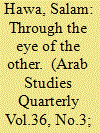

|
|
|
|
|
| Publication |
2014.
|
| Summary/Abstract |
This article seeks to apply Derrida's deconstruction of elements constituting national identity as established under colonial power to the study of Bassam Tibi, Fouad Ajami, and Bernard Lewis' work on Arab identity. This approach allows the emergence of colonial and neo-colonial elements underlying these authors' understanding of what Edward Said identified as the "Arab condition." Analyses show that both Arab authors' definition of Arab identity has been heavily influenced by colonial powers in a threefold manner: early colonization of the Arab lands by the Ottomans until 1920, European colonial rule during the nineteenth and twentieth centuries, and finally, the impact of living in the West. The article also highlights how the colonial power, exemplified in the work of Bernard Lewis, chooses to view the colonized "other" and often changes this view in accordance with political expediency.
|
|
|
|
|
|
|
|
|
|
|
|
|
|
|
|
|
|
|
|
|